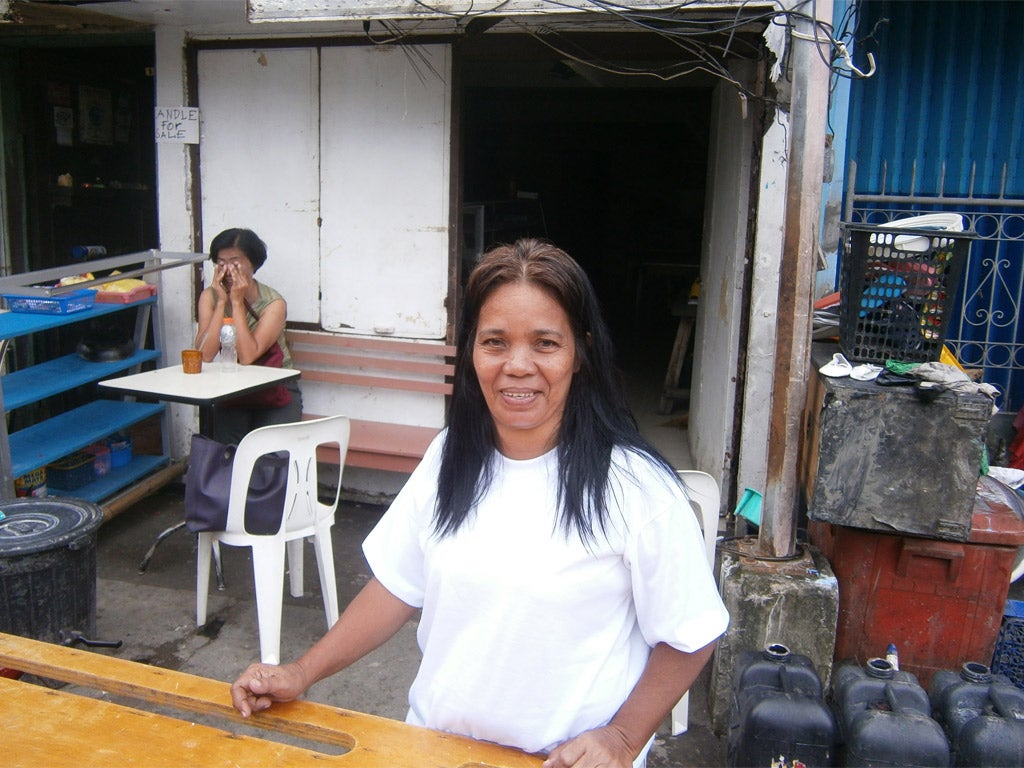Six days on from Typhoon Haiyan – and the first restaurant reopens in Tacloban
After the horror, life takes a small step towards normality in a city wracked by hunger and thirst

It was not as if Marchite Ygrubey had taken a conscious decision to be an example of a community bouncing back. She simply had no other choice.
In the aftermath of Typhoon Haiyan, with homes destroyed and services halted, the 51-year-old fretted about how was going to provide for her three daughters. The only option, she decided, was to somehow reopen her business.
In the stories that will be told about the destruction wreaked on Tacloban by perhaps the world’s most powerful storm, the 51-year-old may earn a footnote as being the first person to reopen a restaurant in a city wracked by hunger and thirst.
“I think I was the first to reopen,” she said, sitting in flickering candlelight in front of her simple eatery. “I could not wait for help. I had to get the money for my family.”
Aid workers talk of the importance of events such as the reopening of Sula Canteen, located off of Tacloban’s Zamora Street. They say that in the aftermath of natural disasters, the restarting of markets and shops – even the hawking of cigarettes obtained by questionable means – marks the transition of a community from being in a state of utter shock to one thinking about rebuilding.
“It’s really good to see fresh goods for sale and food entering the city,” said Joe Lowry of the International Organisation for Migration, an inter-governmental body that focuses on displacement.
“It shows that people are getting on with their lives, taking charge and trying to get things back to normal.”
Mrs Ygrubey said her husband had died four months ago after suffering a heart-attack, leaving her to raise their three daughters by herself. With no markets of wholesalers open in Tacloban, she had travelled 60 miles by bus to the town of Capbalogen, bought fresh meat and vegetable and rice, and brought it back to her restaurant to cook.
She said the round trip involved several changes of bus and took a total of five hours. Still, by the sixth day after the storm tore through the eastern Philippines, killing several thousand people and leaving more than 600,000 homeless, she was ready to reopen.
“My husband taught me how to cook. But I employ two chefs,” she said.
The fare at the Sula Canteen was simple and wholesome. For the equivalent of £1.30, The Independent enjoyed a vast grilled pork chop with rice and side-order of black beans. It was quite delicious.
As word of the reopening of the restaurant spread around the quiet streets, all still without electricity, the Sula Canteen soon filled out. Two men sat opposite one another tucking into a plate of fired minced pork.
Another customer, Amy Quajada, a local government employee, sat eating by herself. She said even though she worked for the social welfare department, she and other staff had been declared victims of the storm and told not to yet report for work.
And with relief supplies of food taking time to be delivered, Mrs Quajada was happy to be eating Mrs Mrs Ygrubey’s cooking. “She is keeping us all alive,” she said.
It would be wrong, of course, to assume that something as simple as the reopening of a restaurant means the problems of Tacloban are over. For every person one meets like Mrs Ygrubey, another is struggling.
On Tuesday morning, Fr Robert Reyes, the Philippines’ celebrated jogging priest, organised a “run to overcome” for homeless residents now living in tents erected next to the town’s convention centre.
“The walk is to help people overcome everything – their depression, their cynicism and most importantly their dependency,” he claimed. “The important thing is to tell people they don’t have to be a victim.”
Yet all around him were people who quite clearly felt like victims. Ramel Basas, a 33-year-old man, was searching for his parents, missing for nine days. A woman called Yolanda told how one of her three children, a 15-year-old daughter, had been lost in the storm surge. “I have no job, no home,” she said.
At the same time, aid workers have commented repeatedly on the resilience displayed by the people of towns such as Tacloban and Guiuan, the coastal city where officials estimated 100 per cent of buildings have been damaged or destroyed.
On the evening of the reopening of the Sula Canteen, after the restaurant had put up its shutters for the night, the staff were sitting outside, talking in the evening coolness
How many customers had they had? Mrs Ygrubey smiled. “We had lots of customers.”
Subscribe to Independent Premium to bookmark this article
Want to bookmark your favourite articles and stories to read or reference later? Start your Independent Premium subscription today.

Join our commenting forum
Join thought-provoking conversations, follow other Independent readers and see their replies